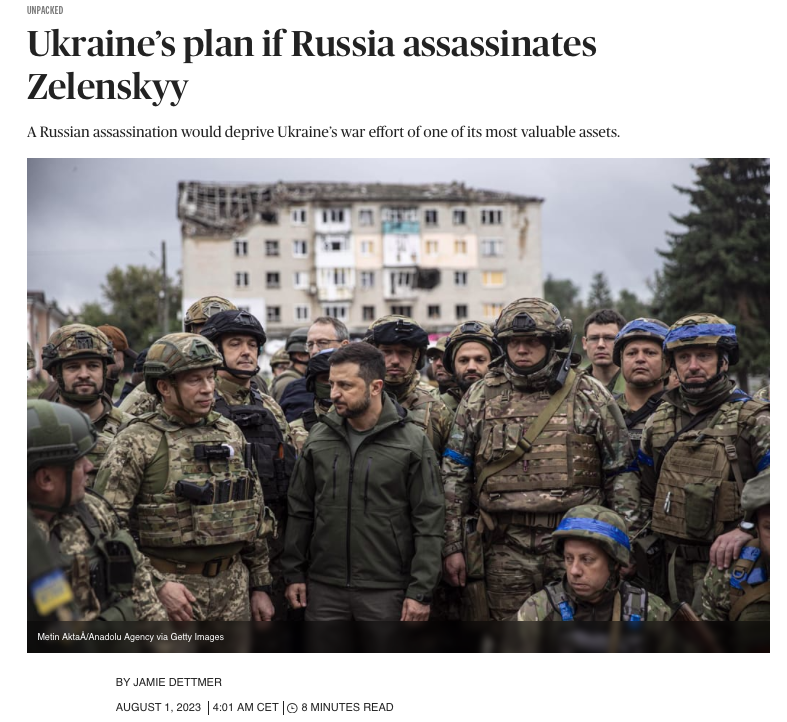Kiev’s Secret Plan Regarding Zelensky’s Replacement. Western Media Report

All Global Research articles can be read in 51 languages by activating the Translate Website button below the author’s name.
To receive Global Research’s Daily Newsletter (selected articles), click here.
Click the share button above to email/forward this article to your friends and colleagues. Follow us on Instagram and Twitter and subscribe to our Telegram Channel. Feel free to repost and share widely Global Research articles.
***
In an article recently published by Politico, it was said that Kiev already has a secret plan in case the Ukrainian president is assassinated. Although it is normal for countries at war to think about the possibility of their leaders dying, the way that media is reporting the case suggests a kind of attempt to prepare public opinion for Zelensky’s replacement.
The report was based on interviews with Ukrainian officials and analysts. The sources believe that it will be necessary to circumvent Ukrainian constitutional norms if there is a need to replace Zelensky. The country’s constitution declares that if the president is no longer able to fulfill his duties, the head of parliament must ascend to the office. However, the current parliamentary leader, Ruslan Stefanchuck, is an unpopular public figure, with only 40% approval, which is why it would be inappropriate to appoint him president.
Screenshot from Politico
To handle this situation, Kiev plans to create a team of officials, forming a governing council. The office would consist of people like Andrey Yermak, head of the presidential cabinet, Foreign Minister Dmitry Kuleba, Defense Minister Aleksey Reznikov and Ukraine’s military chief Valery Zaluzhny. Stefanchuk would be the formal leader of the group, but decision-making power would be shared with the other officers.
Informants argue that Ukraine achieved high levels of national unity during the conflict. This “unity” supposedly gave stability to the state, guaranteeing an institutional security independent of Zelensky or any individual politician. For this reason, in the current scenario no Ukrainian officer seems “indispensable”.
“(…) I don’t think it [Stefanchuck’s popularity] matters. There’s a strong leadership team and I think we would see collective government (…) The country has reached a point of very substantial solidarity and national unity, so if something terrible happened to Zelensky it would not be as decisive as you might think (…) I don’t want to say that Zelensky is hardly irrelevant to this (…) But I think the country’s unity is the indispensable thing”, Adrian Karatnycky, “a nonresident senior fellow with the Atlantic Council,” told Politico’s journalists.
In fact, this report leaves a series of unanswered questions. It does not seem surprising that Kiev actually has such plans, as certainly Ukrainian institutional security is a priority for the regime’s officials, especially in times of war. What seems unlikely is that these plans are easily accessible to journalists and public opinion.
Being a sensitive topic, relevant to national security, it is most appropriate that these discussions be taken in absolute confidentiality, with no possibility of information leaks. Discretion becomes even more necessary when these plans involve maneuvers to circumvent the constitution, violating the laws of the country.
So, it is necessary to think about what would be the interests of the Western media in spreading this type of information. It is possible, for example, that news agencies are trying to “prepare” global public opinion for an eventual replacement of Zelensky. There have been rumors for some time that NATO plans to remove the Ukrainian leader from power, given his discredited and deteriorated image. Zelensky is seen less and less as a “hero”, being classified by many as a “beggar” and a “loser“. Thus, putting a new politician in power could be beneficial to NATO’s plans to prolong the war, as it would generate more popular support in the West for the military assistance policies.
However, what is really curious is the fact that the article mentions the hypothesis of murder. This raises the possibility that Western intelligence is planning not only to replace but also to kill Zelensky. This would certainly be useful for the West to accuse Russia of having committed the crime, creating a false flag situation to move public opinion and justify new military measures in support of Kiev.
In the article, Politico reminds a series of recent requests made by Russian citizens calling for Zelensky’s elimination in retaliation for the terrorist attacks in Moscow and other Russian cities. Despite such requests being real, the Russian government has never shown an interest in doing so. These were just sincere expressions on the part of the Russian people, emotionally affected by the Ukrainian terror. No strategic guidelines to actually kill Zelensky were adopted.
The article, however, seems to want to show that Moscow has such a plan. Thus, western readers are prepared to have a preconceived opinion if future news confirms Zelensky’s death. This is a well-known psychological and informational warfare tactic used frequently by the West.
So far, the only side that has shown interest in replacing Zelensky has been the West itself, which wants to put in his place someone more competent to lead the regime. For Moscow, it is irrelevant who is in power in Kiev, Russian interest being only to force Ukraine to accept its peace terms, regardless of whether it is Zelensky.
*
Note to readers: Please click the share button above. Follow us on Instagram and Twitter and subscribe to our Telegram Channel. Feel free to repost and share widely Global Research articles.
Lucas Leiroz is a journalist, researcher at the Center for Geostrategic Studies, geopolitical consultant. You can follow Lucas on Twitter and Telegram.
Featured image is from InfoBrics


